
Hey there! So, you’re probably here because you’ve heard a lot about quartz countertops. I mean, who hasn’t, right?
These beauties are all the rage right now and for good reason.
Nothing sets the tone in a kitchen quite like a gleaming, well-maintained quartz countertop.
Quartz’s popularity is soaring due to its beauty, durability, and ease of maintenance.
But, like all things valuable, the question of how to best care for it naturally arises.
Do quartz countertops stain? How should they be cleaned?
What are some best practices for ensuring their longevity?
My guide addresses these queries and more, so read on.
Important: On this website, I feature a select number of partners and companies that have products that could help my audience. As an Amazon associate, When you purchase something through my partner links, I might get paid for the referral at no extra cost to you. Read the full disclosure here.
This Post is about Can quartz countertops stain?
So Can quartz countertops stain ?
The simple answer is yes. You are shocked right….
Let’s understand what I said. Quartz is a stain resistant material however it is not stain proof.
They do not stain but they can stain… just bare with me
I will go over everything you need to know about caring for Quartz countertops.
So let’s get started…..
JUMP TO:
Understanding Quartz Countertops

So, first things first.
How exactly are quartz countertops made, and why does this matter when it comes to stains?
Well, let’s break it down.
Quartz countertops are an engineered material made by combining about 90% ground natural quartz with around 10% polymer resins.
This combination creates a super-hard material that’s even more durable and long-lasting than granite.
Because of this process, quartz countertops have a non-porous surface, meaning there aren’t any tiny holes for spills to seep into and cause stains.
So, next time you spill your morning coffee, don’t panic – your quartz countertop has got your back!
But wait, there’s more. Let’s chat about the role of natural and engineered stone in quartz countertop durability.
You see, the natural quartz in these countertops gives them the hardness and lack of porosity needed for durability.
At the same time, the polymer resins make them flexible and prevent cracks and chips.
It’s like a superhero team-up of materials that provides you with a surface that’s not just good-looking, but also super durable.
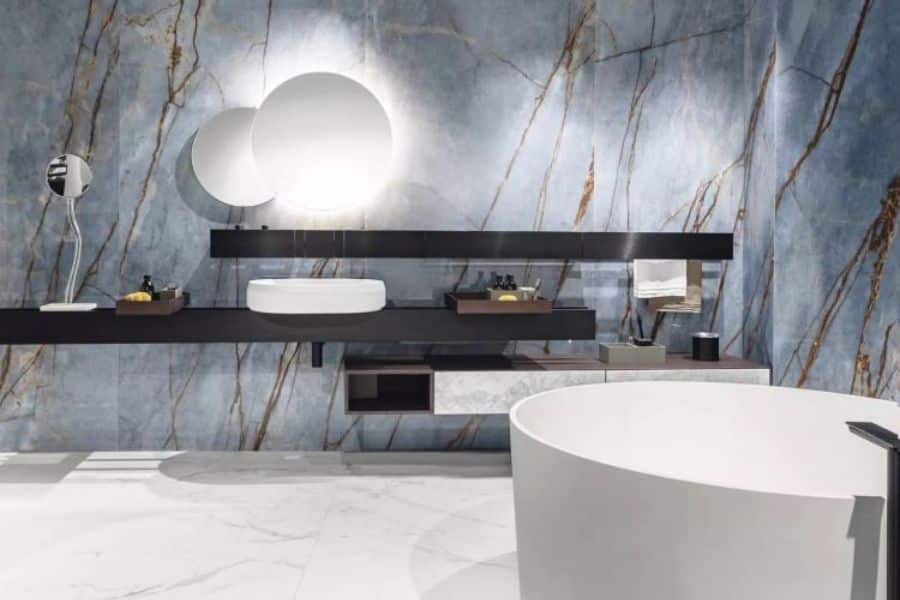
And speaking of good-looking, quartz countertops are a design lover’s dream.
They come in a variety of colors, from pure white to jet black, and everything in between.
And the fun doesn’t stop there.
Thanks to the manufacturing process, you can get quartz that mimics the look of marble, granite, or even concrete.
Whether you’re going for a sleek modern vibe or a warm rustic feel, there’s a quartz countertop that’s just right for you.
Now the not so great part….
Quartz countertop material is heat resistant but not heat proof.
You should not put hot pans directly on quartz counters.
Always use hot pads. The high heat cab cause a burn mark on your countertop surface.
Why Quartz Countertops are Stain Resistant

Quartz is a stain-resistant countertop because it is non porous
First off, the whole thing about quartz countertops being “non-porous” – what does that mean?
In simple terms, it’s about the surface not having tiny holes.
Picture this: you’re at a party and someone spills a glass of red wine.
If this happens on a porous surface, the wine finds those little holes and seeps in, leaving a stain that’s hard to remove.
But on a non-porous surface, like a quartz countertop, there are no holes for the wine to seep into.
So, the liquid just sits on the surface, waiting for you to wipe it away. That makes quartz stain resistant.
Now, how does quartz stack up against other popular countertop materials, like natural stone and granite countertops?
Well, natural stones like granite or marble are naturally porous.
They can be sealed to make them more stain-resistant, but they will never be as resistant as quartz.
Plus, the sealant can wear off over time, leaving the stone vulnerable to staining again.

CHECK OUT THE BEST COLLECTION OF MARBLE, QUARTZ & QUARTZITE SLABS IN THE DALLAS METROPLEX
Why Quartz Countertops can stain

Prolonged Exposure to Staining Substances
Although quartz is stain resistance, leaving spills unattended can cause stains on white countertops.
Stains can occur when substances like wine, coffee, tea, and oil are allowed to sit on the countertop for a prolonged period.
The key is to wipe up spills right away.
How to Prevent Stains on Quartz Countertops
While quartz countertops are stain-resistant and tough, they do appreciate a little TLC.
After all, prevention is better than cure, right?
Let’s start with those staining liquids.
It’s a good idea to avoid direct contact between your quartz countertops and staining substances.
Here’s where your trusty
It’s best to chop up those juicy tomatoes or prepare your lemon zest on a
Lemon juice and tomato sauce are acidic in nature. It’s best to not let them sit on your quartz slabs for a longer period of time.
And if a spill does happen? No big deal, just wipe it up promptly, so it doesn’t have a chance to dry and potentially leave a mark.
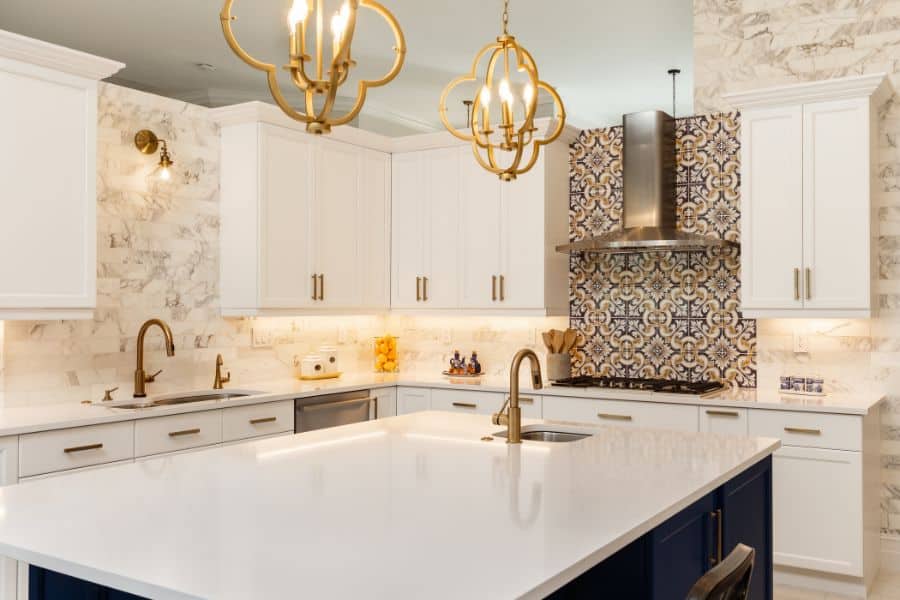
Household items that can stain your elegant quartz countertop:
- White Vinegar
- oven cleaner
- Nail polish remover
As you must have seen me kind of repeating the same thing again. The items listed above will not stain quartz right away.
You just need to make sure, these products are not left on the surface for long.
How to Clean and Maintain Quartz Countertops
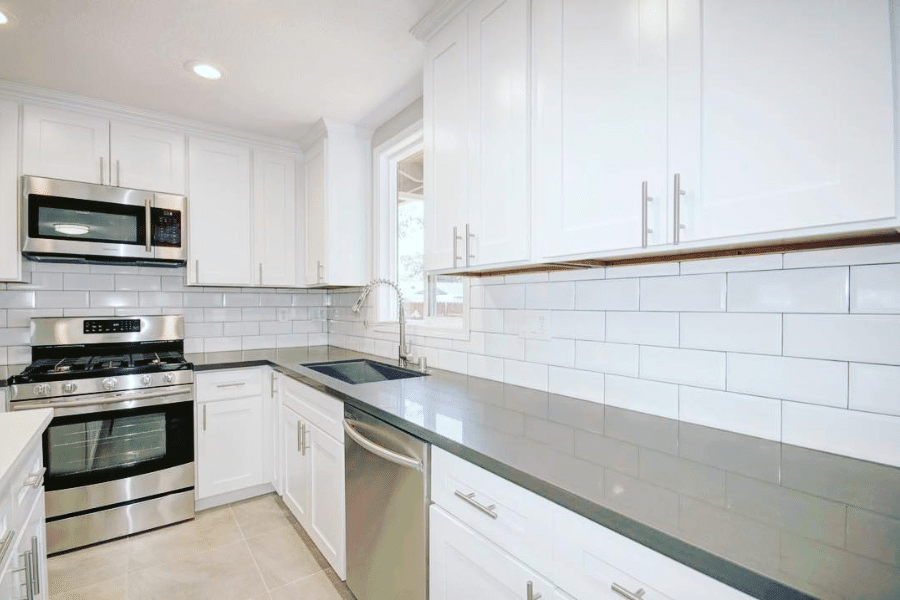
Regular Cleaning:
Warm water and mild soap/detergent: The easiest way to clean quartz countertops is with warm water and mild soap or detergent.
Combine warm water and a drop of mild soap or detergent in a bowl.
Soak a soft cloth or non-abrasive sponge in the solution, then wring out the excess water.
Wipe down the countertop: Use the damp cloth or sponge to wipe down the countertop.
Always use a circular motion to ensure you’re thoroughly cleaning the surface.
Avoid scrubbing or using too much pressure, which can damage the countertop.
Rinse and dry: Rinse the cloth or sponge with clean water, wring it out, and wipe down the countertop again to remove soap residue.
Then, dry the countertop with a
Countertop Essentials :
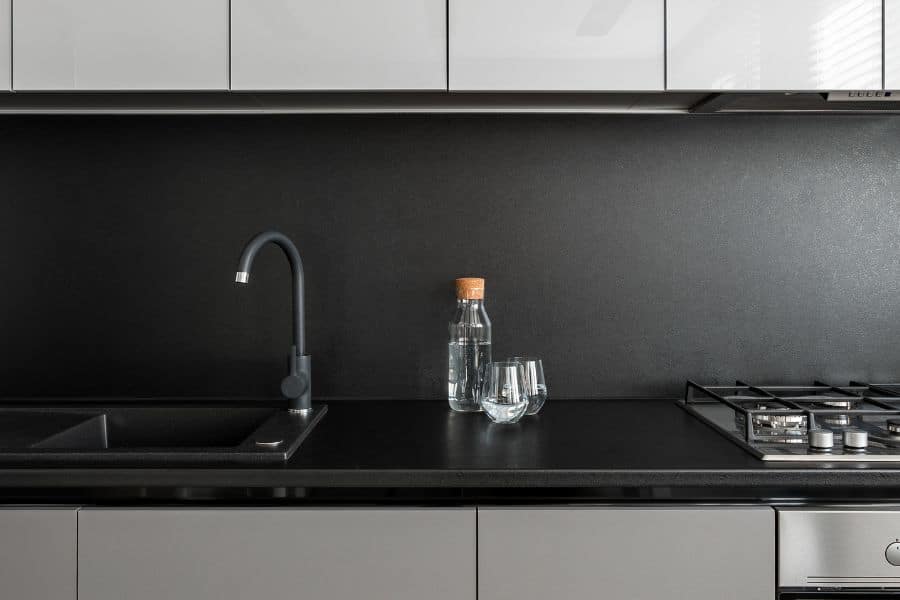
Specific Cleaning Products and Tools:
Quartz cleaners: These are specially formulated to clean quartz countertops without causing damage.
Always follow the manufacturer’s instructions when using these products.
This is my favorite Quartz Countertop cleaner.
Glass cleaner: A good glass cleaner can help to remove streaks and provide a shiny finish to your quartz countertops.
Simply spray the cleaner on the surface and wipe it off with a
Microfiber cloths: These are great for cleaning quartz countertops because they’re soft and won’t scratch the surface.
They’re also super absorbent, so they’re excellent for drying the countertop after cleaning.
What to Avoid:
- Harsh Chemicals (cleaners): Quartz countertops are durable, but they’re not invincible.
Avoid using harsh cleaners, such as bleach or ammonia, as they can dull the surface of the quartz over time.
- Acidic or alkaline cleaners: These can harm the surface of the quartz, leaving it dull and more susceptible to stains.
Vinegar, lemon juice, and baking soda are all examples of cleaners to avoid.
- Abrasive sponges or scrubbers: These can scratch the surface of the quartz.
Always use a soft cloth or non-abrasive sponge for cleaning.
- Treating Specific Quartz Countertop Stains:
Different types of stains require different treatments:
- Oil-based stains: For stains from grease, cooking oil, or cosmetics, clean with a mild dish soap and warm water, then rinse and dry thoroughly.
- Ink or permanent marker: Wipe with a damp cloth and a small amount of rubbing alcohol.
- Wine, coffee, or tea stains: Wipe the area with a cloth and a mild detergent soapy water , rinse well, and dry thoroughly.

Hard water stains:
Hard water stains can be a common issue on quartz countertops, especially in areas with high mineral deposits in the water.
Quartz cleaners are specifically designed to clean quartz countertops without causing damage.
Look for a product that specifies it can remove hard water stains.
Dealing with Stubborn Stains
Some stains on kitchen countertops demand a bit more attention.
For these stubborn blemishes, a paste made of baking soda and water can work wonders.
Apply the paste, allow it to sit for a few minutes, then gently wipe it off with a dry cloth.
This can often lighten or entirely remove the stain.
Best Practices for Keeping Your Quartz Countertops Stain-free

Keeping quartz countertops in pristine condition is certainly achievable with the right care and maintenance.
Here are some best practices for keeping your quartz countertops stain-free:
- Dry After Cleaning: After any cleaning routine, it’s crucial to dry the surface of your quartz countertops thoroughly.
This not only prevents water spots but also ensures any residual cleaning agent doesn’t remain on the countertop.
Use a clean, dry,
- Handling Permanent Marker: While it’s best to keep permanent markers away from your quartz countertops, accidents can happen.
If your countertop gets marked, use a soft cloth with a small amount of rubbing alcohol and gently rub the stain.
Make sure to rinse the area well with warm water and dry it thoroughly after the marker has been removed.
- Dealing with Paint Thinners: Some chemicals, such as paint thinners, can be harmful to quartz countertops.
If there’s a spill, wipe it up as quickly as possible with a cloth dampened with warm water and mild soap.
Avoid rubbing or scrubbing the spill as this could spread it or cause it to penetrate deeper into the quartz.
- Managing Hard Water Spots: Hard water can leave unsightly spots on your quartz countertops.
To deal with this, consider using a specially formulated hard water stain remover.
- Using Coasters and Cutting Boards: While quartz is highly resistant to staining and scratching, it’s best to use coasters under any glasses.
Especially if they contain alcohol or citrus juices.
Also, use a
- Wipe Spills Immediately: The longer a spill remains on the quartz, the higher the chance it will stain.
Whether it’s wine, oil, or juice, make it a habit to clean up immediately.
- Avoid Extreme Heat: Quartz can be damaged by extreme heat.
Always use trivets or hot pads under hot pots and pans to protect your quartz countertops from heat damage.
Implementing these advanced tips into your regular cleaning routine can greatly extend the life and beauty of your quartz countertops.
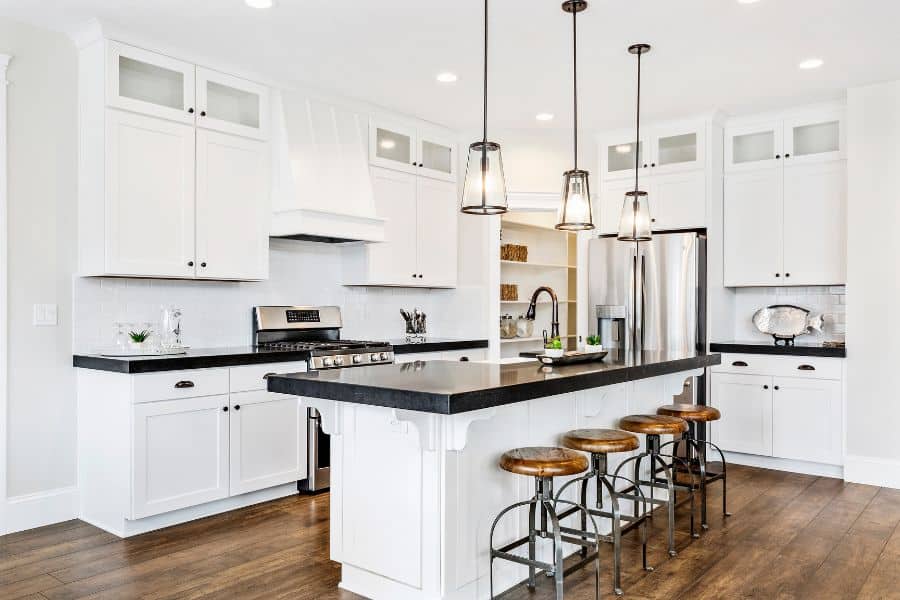
FAQs
Can quartz countertops be damaged?
Yes, while quartz countertops are highly durable, they can be damaged by high heat, severe impact, harsh chemicals, and abrasive materials.
Are there stain-resistant quartz countertops?
All quartz countertops are inherently resistant to staining due to their non-porous nature.
However, certain factors can influence this resistance, including the type and color of quartz, and the stain source.
Do I need to seal my quartz countertop?
No, unlike natural stone surfaces, quartz countertops do not require sealing. They are naturally non-porous and resist staining quite well.
Can I use bleach on my quartz countertops?
It’s best to avoid bleach on quartz countertops as it can break down the bonds between the quartz and resins, leading to discoloration and damage.
What’s the best cleaner for quartz countertops?
A mild dish soap mixed with water or quartz-specific cleaners are typically the best options for cleaning quartz countertops.
Can quartz countertops withstand hot pots and pans?
While quartz is heat resistant, it’s not heatproof. Constant exposure to high temperatures can lead to cracks and discoloration. It’s best to use trivets or heat pads with hot cookware.
This Post was about Can quartz countertops stain?
If you like this article please share it on Facebook. It would mean the world to me.
Here are some more articles you might like:
The Ultimate Guide: Pros and Cons of Onyx Showers
Guide to How Long Do Quartz Countertops Last [2023]
Tips on Choosing the Best Stone for Shower Walls
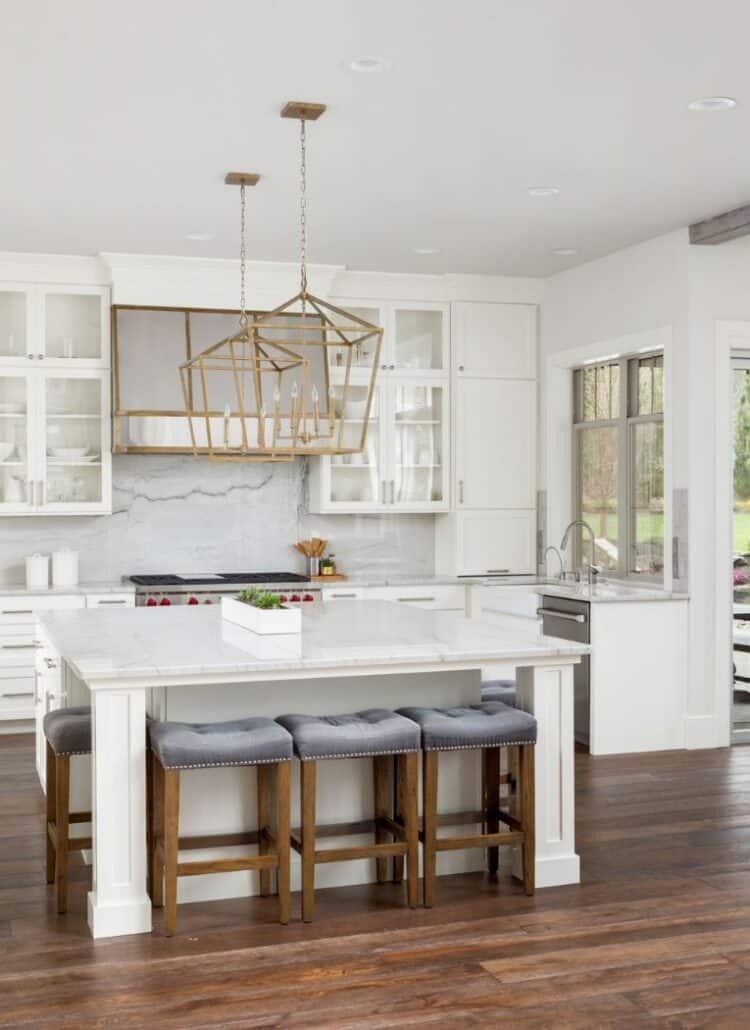
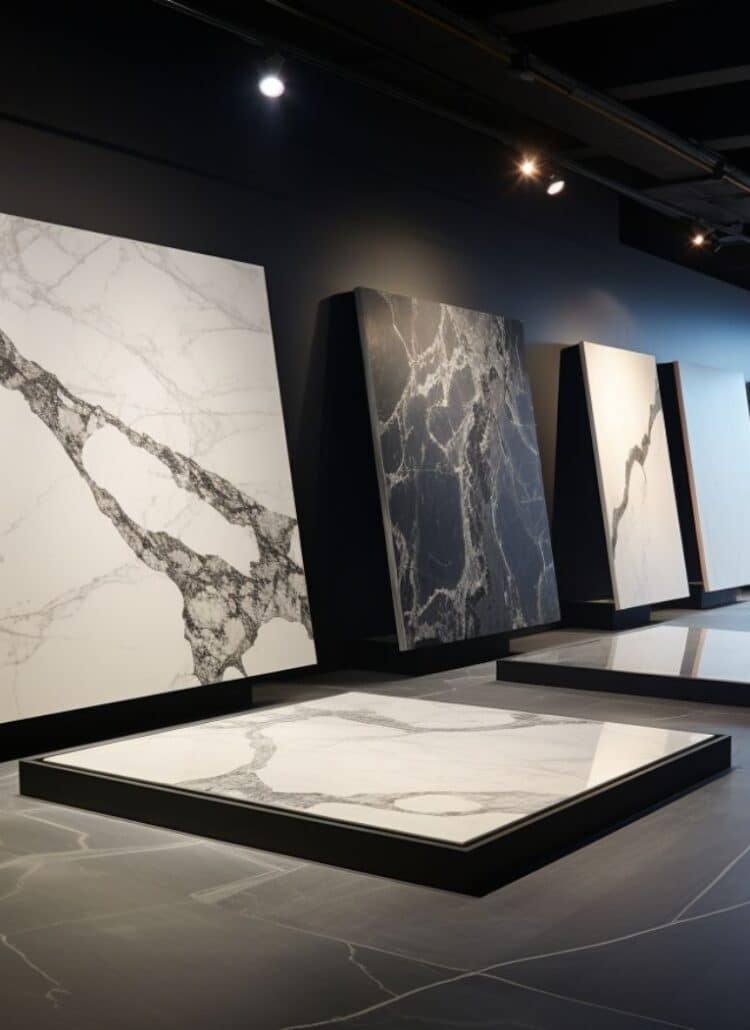




Leave a Reply